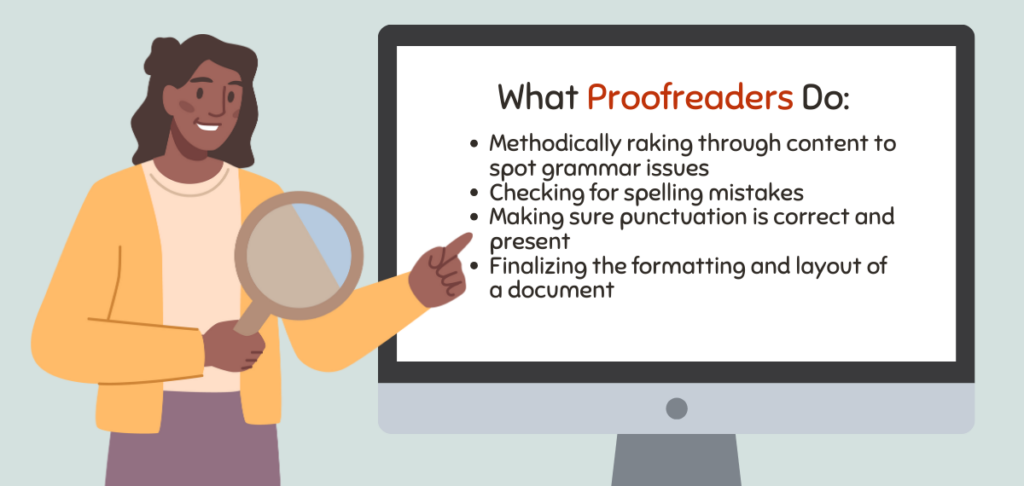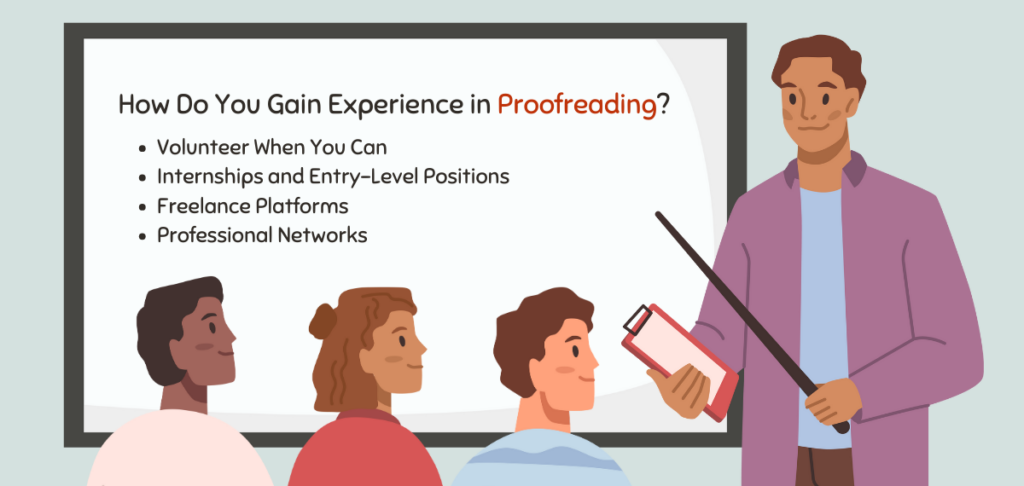Becoming a proofreader is about honing the necessary skills to uphold the integrity of written content in any form. This means meticulously combing through every line and page to make sure it’s free from spelling, grammar, typographical, and formatting errors.
Now, proofreading is different from editing, although the two often tend to overlap. Editing is about digging deep into the written content to mold and whip it into shape. Proofreading is more for surface errors like missing commas, incorrect fonts, and a forgotten indent.
Starting and maintaining a career in proofreading doesn’t happen overnight, no matter how good your skills are. There are other things to consider, like proofreading courses, certifications, and other forms of training.
Lucky for you, I created this quick guide to becoming a proofreader that breaks down all the important details about what it takes to become a professional proofreader. Are you ready to get started? Let’s get to it!
What Exactly Does a Proofreader Do?
Proofreading isn’t just about having a keen eye for detail—it’s an art form that demands a deep appreciation for language and its nuances. But what does this role entail exactly? Let me break it down for you!
Professional proofreaders do things like:
- Methodically raking through content to spot grammar issues
- Checking for spelling mistakes
- Making sure punctuation is correct and present
- Finalizing the formatting and layout of a document
Basically, proofreaders ensure that every piece of writing is ready for the public eye. This process usually comes after many rounds of deep editing to catch anything that was missed.
Most writers or industry professionals stick with proofreaders for future projects when they find a good one. I love my proofreader! While I have the skills and experience to proofread my own work (and I do), having a second set of fresh eyes on my writing has proven to be invaluable. She catches things I overlook a gazillion times.
The importance of proofreading spans across so many different industries, including publishing, academic, marketing, and legal, making it an indispensable skill set for guaranteeing the clarity and professionalism of all written content.
Take your grammar skills to the next level
Take Our Copyediting Course
What Are the Must-Have Skills for Proofreaders?
If you ask me to master the craft of proofreading and maintain a rewarding career, certain core skills are just non-negotiable:
- Unwavering Attention to Detail: Spotting the slightest discrepancies in text requires a laser-focused eye.
- Amazing Command of Language: A strong understanding of the language, including grammar, spelling, and punctuation rules, is a must.
- Patience and Concentration: This can be hard for all of us, but proofreading demands the patience to go through lengthy documents and the concentration to maintain consistency.
- Time Management: Meeting deadlines while also juggling other projects and maintaining high-quality work is a balancing act that every proofreader needs to learn. We all have our own ways of managing our time efficiently, so find a system that works for you.
- Soft Skills: Beyond the hard skills, patience, excellent communication abilities, and adaptability to different writing styles and formats will definitely come in handy for managing your career.
How Can You Get Qualified and Trained as a Proofreader?
Yes, you can totally get qualified and trained as a professional proofreader! Clients tend to gravitate toward service providers with these special qualifications.
So, you not only hone your craft even more but also set yourself apart from the sea of other freelance proofreaders. Here are some important details and tips for navigating that:
- Formal Qualifications: Having or getting a degree in English, journalism, or a related field can provide you with a strong foundation, but it’s not always mandatory. It does look good on paper, though!
- Certifications and Courses: Enrolling in proofreading courses, like the one Grammarist offers, and obtaining certifications from recognized institutions can bolster your credentials and provide practical knowledge. There’s always something new to learn!
- Self-Learning: The internet is a treasure trove of resources if you know where to look. YouTube is chock-full of industry professionals sharing tips, training, and more. Spend some time with online tutorials, sign up for webinars, and study different guides to sharpen your proofreading skills.
How Do You Gain Experience in Proofreading?
Getting your foot in the door is the first step, but it can sometimes feel like a giant one. In a way, that’s because it is, but only because you’re usually starting at ground zero. You can’t launch a new career without experience to show for it… or can you?
I’ll cut to the chase. You can. I did, and here are some tips that I used in my early years as a writer, author, and editor to help bolster my belt:
Volunteer When You Can
Offering your proofreading services to local nonprofits, schools, or online forums can be a great start. The work you do for them can be used in your portfolio and resume.
You can choose whether to state that it was volunteer work or not, depending on how you feel it will benefit you when applying to gigs.
I’d like to note that with free or volunteer work, always make sure you have the time available and can support yourself while doing so.
Internships and Entry-Level Positions
Keep an eye out for opportunities in publishing houses, magazines, or content creation companies. Job sites like Indeed and Mediabistro are always posting temporary jobs like these.
Just remember that these often pay very little, if anything at all. Entry-level jobs usually have a minimum wage salary, and most internships are unpaid. Always check with the employer, and make sure you have the means to support yourself during your time there.
Freelance Platforms
Freelance job sites like Upwork, People for Hire, and Freelancer can help you build a portfolio and open the door to a ton of projects. Once you create your account and portfolio, you can scroll through their gig listings and apply to any you can confidently do.
The beauty of these sites is that they usually show the rates other proofreaders are including in their bids so that you can stay pretty competitive.
Professional Networks
Joining organizations like the Editorial Freelancers Association can connect you with mentors and job opportunities. I like professional networks like this because you also get to mingle with your peers. I’ve gotten invaluable tips and helpful info from various groups and associations I’m part of.
Advancing Your Proofreading Career
The best thing about working for yourself is that you can climb that ladder at your own pace and comfort level. Spend however long you want in the early stages of your career honing your craft, collecting new skills like Pokémon, and building relationships with clients.
When you’re ready to kick things up a notch, consider these tips for advancing your proofreading career:
- Try Your Hand at Specialization: Proofreaders are pretty versatile, but mastering a certain niche, like legal proofreading or medical proofreading, can put you in high demand.
- Continuing Education: Always be looking for new things to learn. Take online courses for experienced proofreaders, sign up for a few free (or paid!) webinars, or find YouTube channels that offer more training and tutorials for mid-level proofreaders.
- Networking: I can’t stress this one enough. Other proofreaders are not your competition; they’re your peers and can bring invaluable assets to the table for everyone to share.
- Portfolio Development: Always tweak and update your portfolio as your career progresses. Showcasing your best work can attract higher-profile clients and projects.
Are You Ready to Become a Proofreader?
Launching a career as a proofreader opens the door to a world where precision and passion for language converge. By honing your skills, gaining relevant experience, and continuously learning, you can carve out a successful niche for yourself in the field of proofreading. I promise! It just takes time and patience.
Working for yourself can be challenging, but it’s also so rewarding because, with every inch of effort you put in, you get back threefold in the form of experience, professional relationships, and a scalable skill.
If you found my tips in this guide helpful at all, be sure to check out my other articles on becoming a proofreader to get a well-rounded idea of what to expect. If and when you’re ready, we also have an amazing online course you can take at your own pace that teaches everything you need to know!


